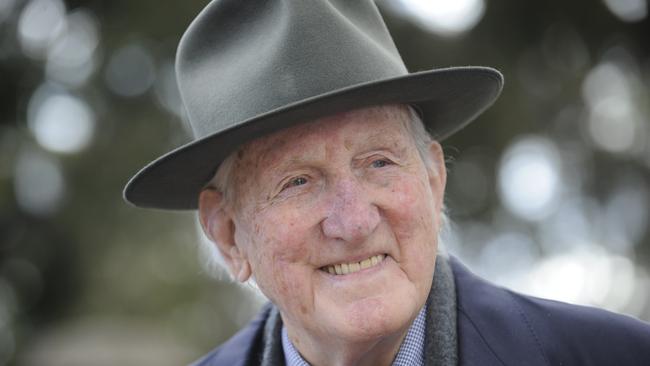Boxer turned warrior for peace and social justice
AFTER witnessing the worst aspects of war Tom Uren returned to Australia a changed man, determined to fight, but this time in the political arena and for social justice.

Today in History
Don't miss out on the headlines from Today in History. Followed categories will be added to My News.
Although his face bore scars inflicted in the boxing ring, Labor stalwart Tom Uren was a pacifist. War service and his time as a prisoner of the Japanese interrupted a boxing career and convinced him that human progress could only come by building bridges and working together peacefully.
After witnessing some of the worst aspects of war he returned to Australia a changed man, determined to fight, but this time in the political arena and for social justice. Uren, who died yesterday at 93, often talked about the importance of love and said how it underpinned his attitude to life and his love of humanity.
A long-serving minister in the Gough Whitlam and Bob Hawke governments he once said Stalin had given socialism a bad name and successfully sued Fairfax for saying he had communist links. “My objective is to change society, not to reform it. I want to create a more equitable, just and democratic society. I want to help build an environmentally sensitive, beautiful and more tolerant world,” he once told a reporter
Uren was born in Balmain in 1921 (some sources say 1920), his father Tom senior was a labourer, handyman and sometimes jockey who was often out of work. His mother Agnes was a rock through the hard times, instilling in young Uren compassion for others.
Uren was a sports-mad child, playing rugby league with a local team, surfing and swimming, but boxing became his passion, partly because he had the same names as a famous Sydney boxer .
When Uren’s parents moved to Wollongong to be near the steel mills to get work, Tom stayed in Sydney with an aunt. He quit school at 13 and worked as a labourer but began spending a lot of time at famed boxing trainer Jack Dunleavy’s gym on George St. He showed promise as a heavyweight but a bout of flu before his challenge for the title when he was 19 robbed him of the win.
Uren joined the regular army in 1939 and in 1941 was transferred to the AIF. He was fighting the Japanese in Timor when he was taken prisoner in 1942. He spent the rest of the war fighting to stay alive behind barbed wire working on the notorious Thai-Burma railway.
Some of his time as a POW was spent under the leadership of Weary Dunlop who taught him the value of pulling together and facing problems collectively. He got through the hardship primarily by never giving up hope “that I would really go on to follow my profession, and that I would be a professional fighter”. He was still in a prison camp when he saw the sky turn crimson. He later learned it was the bomb dropped on Nagasaki. Soon after the Japanese warders announced the war was over.
When Uren returned to Australia he tried to pick up his boxing career but was unable to regain his pre-war form. He made a living as a labourer before landing a job at Woolworths where he discovered he had leadership qualities. This inspired him to aim for a career in politics. He joined the Labor Party in 1952 and was elected to the federal seat of Reid in 1958.
As a pacifist and member of Labor’s Left he campaigned against involvement in Vietnam and in the ’60s rose to deputy opposition leader. Gough Whitlam’s success in the 1972 election saw Uren appointed minister for urban and regional development. His crowning achievement was the establishment of the Heritage Commission and the register of the National Estate. Uren worked to revive decaying inner city areas, create green spaces and improve the environment.
The workload took a toll on his marriage to Patricia who left him in 1974. He was at her side when she died of cancer in 1981.
When Whitlam was ousted in 1975 Uren remained in the top ranks. But the rise of Bob Hawke and victory in 1983 saw Uren relegated to an outer fringe and a junior ministry in Hawke’s cabinet. He remained a powerful voice of compassion in that government and became a passionate anti-nuclear campaigner.
He stepped down from the ministry in 1987 and quit parliament in 1990. He married opera singer Christine Logan in 1992 and a new phase of life began, Uren followed many of his passions with renewed vigour including serving as chair of the Parramatta Park Trust, campaigning for war veterans and opposing involvement in foreign wars. He was made an Officer in the Order of Australia in 1993 and a Commander in 2013. He is survived by Christine and his children Ruby, Michael and Heather.


